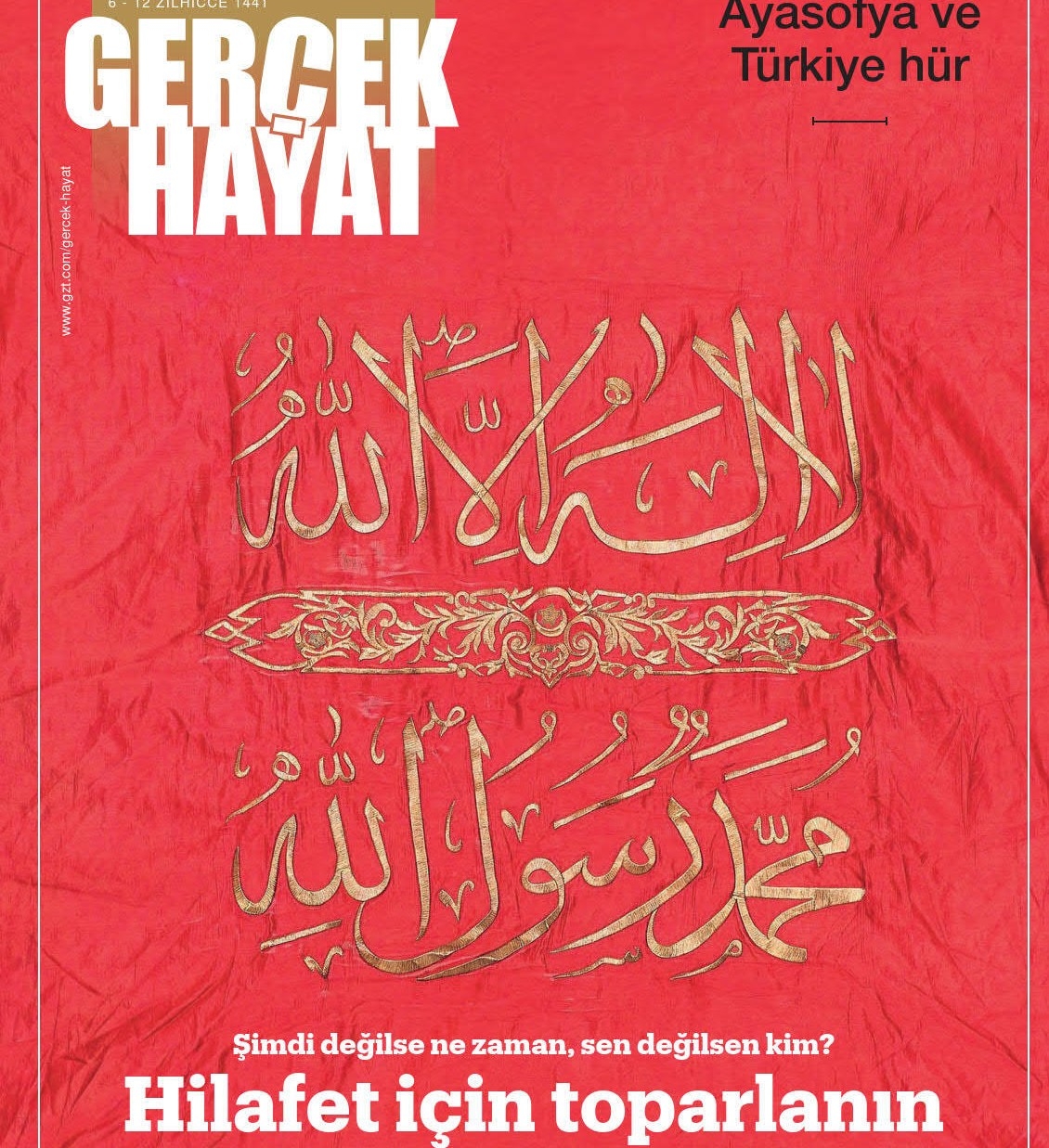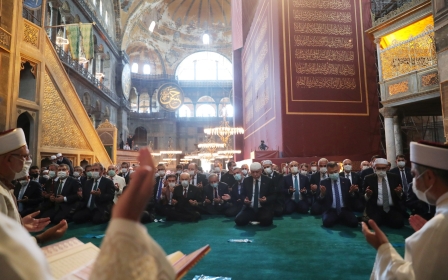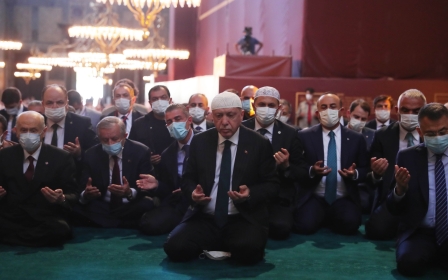A Turkish magazine wants the caliphate back. Controversy followed

A Turkish government-aligned news magazine has triggered a debate in Turkey, with its new front page suggesting the time has come for the redeclaration of the Islamic caliphate in the country following the reconversion of Hagia Sophia into a mosque.
Gercek Hayat, which is owned by the pro-government Yeni Safak media group, featured a red caliphate flag from the Ottoman Empire on its cover and asked in Turkish, Arabic and English: “Get together for caliphate. If not now, when? If not you, who?”
The magazine also said Turkey was now free following President Recep Tayyip Erdogan's reconversion of Hagia Sophia earlier this month.
Gercek Hayat, an Islamist-leaning magazine, has at best 10,000 subscribers. But the cover provoked a response from Erdogan's ruling Justice and Development party (AKP) spokesperson Omer Celik.
“The Republic of Turkey is a democratic, secular and social state governed by the rule of law,” Celik tweeted, echoing the first article of the Turkish constitution.
New MEE newsletter: Jerusalem Dispatch
Sign up to get the latest insights and analysis on Israel-Palestine, alongside Turkey Unpacked and other MEE newsletters
“It is wrong to create political polarisation regarding Turkey’s political regime. Our republic is the apple of our eyes with its all attributions. The unhealthy debate and polarisation on social media since yesterday on our political regime isn’t on Turkey’s agenda “
The Ankara bar has filed a criminal complaint against the magazine, saying the publication violated the law that bans armed rebellion against the Republic of Turkey and incited the people.
Several newspapers on Tuesday criticised the cover on their front pages. The topic is trending heavily on Twitter, with supporters of differing positions battling it out with opposing online campaigns.
Such debate is particularly meaningful for Turkish society since the government's reconversion of the Hagia Sophia, undoing one of Kemal Ataturk’s signature moves as he founded modern Turkey in the wake of World War One.
During the opening prayers at the newly reconverted mosque, Ali Erbas, head of the Directorate of Islamic Affairs, recited a curse attributed to Mehmed II, which targeted anyone who would try to change the Hagia Sophia’s form from a masjid.
Secular opposition perceived this as an attack on Ataturk, who turned the building into a secular museum in 1934.
Ataturk abolished the caliphate nearly 100 years ago as part of a raft of secularist reforms. For centuries, the Ottoman emperor had held the mantle of caliph, leader of the Muslim world and a title claimed by rulers since the birth of Islam in the 7th century.
'The revival of the caliphate means a new conflict and unforeseen domestic disorder. No one has a right to do so'
- Devlet Bahceli, MHP
Turkish religious conservatives have always seen Ataturk's move as something against the unity of Muslims all around the world, since in their eyes the caliph, like pope in the Vatican, was the ultimate representative of living Islam.
For Ataturk, abolishing the caliph eliminated a rival power centre within the state, but the law ratified by the Grand National Assembly of Turkey transferred its powers to the parliament itself rather than the prime minister or president.
Some Turkish Islamists have since been saying that the parliament now had the power to declare a new caliph, if it so wished.
Devlet Bahceli of the Nationalist Movement party (MHP), one of Erdogan’s chief allies, also opposed the caliphate discussion in a speech earlier this week.
“This case has been closed,” Bahceli said, in an address to his parliamentary group. “The revival of the caliphate means a new conflict and unforeseen domestic disorder. No one has a right to do so.”
Kemal Ozer, the editor of Gercek Hayat, said in a series of tweets that the caliphate was the union of Muslims and not an opponent of the Republic of Turkey.
“On the contrary, it is a ground that would strengthen Turkey,” he said. “Why do those who object the Union of Islam struggle to make Turkey part of the European Union?”
A poll conducted last year, however, indicated that the overwhelming majority of Turkish citizens weren't very excited about the possible return of the caliphate. Nearly 59 percent of 2,500 citizens in 12 provinces said abolishing the caliphate was a good decision.
This article is available in French on Middle East Eye French edition.
Middle East Eye delivers independent and unrivalled coverage and analysis of the Middle East, North Africa and beyond. To learn more about republishing this content and the associated fees, please fill out this form. More about MEE can be found here.




